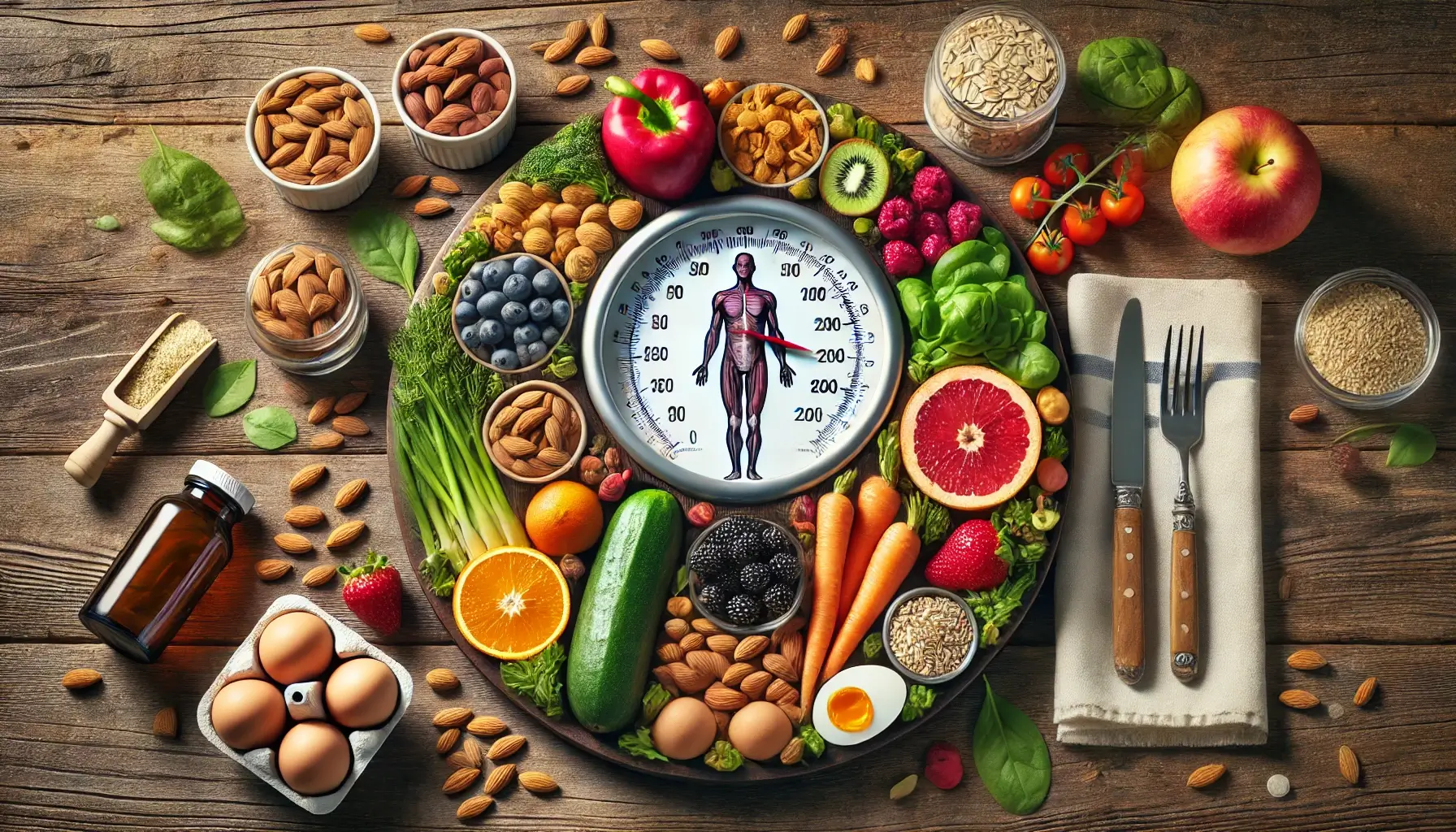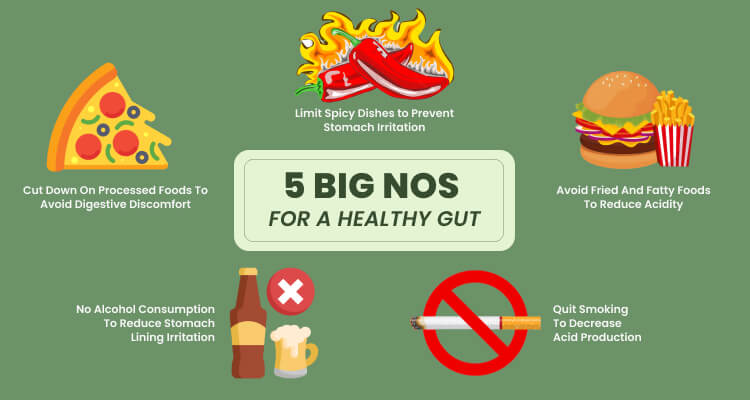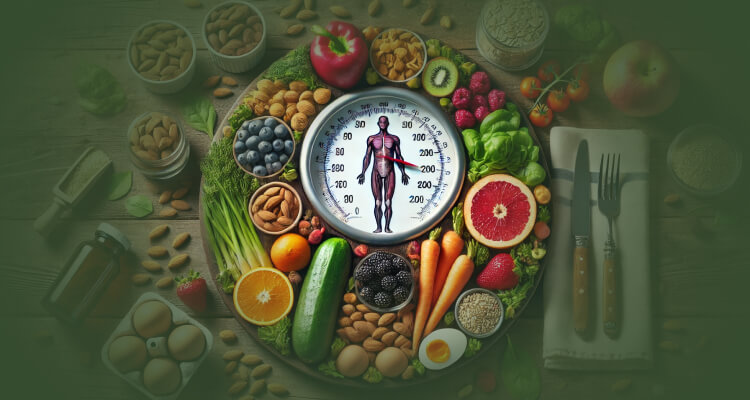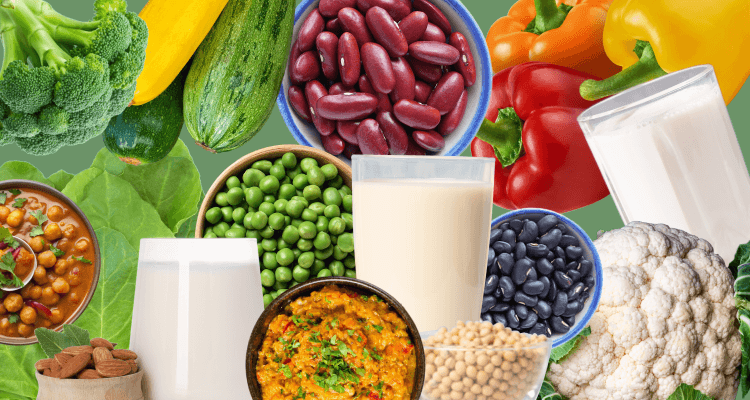What You’ll Learn In the Blog:
- Discover the Ayurvedic concept of digestive fire for gut health.
- Learn about Ayurvedic diets, and how to use them to improve digestion.
- Identify common dietary and lifestyle habits that can disrupt digestion and learn how to avoid them for better gut health.
Is your gut trying to tell you something? Could better digestion be as simple as a few small changes? Let’s see.
Your gut health is directly linked to how you eat and live each day. If you’ve ever felt off balance after a stressful day or a poor night’s sleep, you’re not alone—these things impact digestion more than you think.
The good news? Small tweaks to your diet and lifestyle can make a world of difference.
In Ayurveda, gut health is deeply intertwined with our physical and mental balance, suggesting that a healthy gut is more than just proper digestion—it’s about achieving harmony between mind, body, and environment. From mindful eating habits to ancient practices rooted in Ayurveda, improving your digestion is simpler than you think. Curious how ancient wisdom aligns with modern practices to achieve this balance?

Gut Health in Ayurveda- Understanding The Role of Digestive Fire
Ayurveda refers to the gut as the seat of digestive fire (Agni), which plays a crucial role in how well we absorb nutrients and eliminate waste. When your digestive fire is strong, digestion runs smoothly, improving overall health and vitality. Conversely, a weakened digestion can lead to imbalances that affect our entire system.
In Ayurveda, both the mind and body are interconnected, and the three vital energies—Vata, Pitta, and Kapha—play a central role in maintaining balance, especially in digestion.
- Vata: Governs movement and is linked to bloating, gas, and irregular digestion when imbalanced. You can calm Vata through warm, nourishing foods.
- Pitta: Controls transformation and metabolism. When aggravated, Pitta leads to acidity, heartburn, and inflammation. A cooling, non-spicy diet helps soothe Pitta.
- Kapha: Manages structure and stability. An imbalanced Kapha causes slow digestion, heaviness, and lethargy. Stimulating, light foods that balance Kapha can counter sluggish digestion.
Simple Holistic Diets to Follow for Better Digestion
Ayurveda provides various dietary approaches tailored to balance the doshas and enhance gut health. Here’s how to use Ayurvedic dietary practices for a healthier gut:
1. Dual Dosha Balancing Diet
Ideal For: Balancing doshas; soothing digestive discomfort and inflammation.
Best Season: Late spring to early fall, when balancing both Vata and Pitta is crucial due to fluctuating weather conditions.
The diet focuses on balancing our bodies; Vata and Pitta doshas, which can be particularly helpful if you experience symptoms of both imbalances. If you choose this type of diet, you’ll focus on soothing and cooling foods that support digestive fire and reduce excess acidity. Cooling spices like coriander and fennel help soothe and balance, while sweet, bitter, and astringent flavors stabilize both doshas.

Here are some of the foods that fit into the diet which can balance Vata and Pitta doshas if you choose to follow this approach:
- Pomegranate: With its sweet and cooling properties, pomegranate calms Vata and Pitta doshas, reduces acidity, and supports the healing of the gastric lining. Its bioactive compounds, such as tannins and anthocyanins, enhance its protective effects.
- Coriander: With its bitter and cooling qualities, coriander promotes the formation of digestive enzymes, reduces acidity, and balances Vata and Pitta doshas. Additionally, its antioxidant and anti-inflammatory properties further support digestive health.
- Black Raisins: Effective in balancing Pitta dosha, black raisins neutralize excess stomach acid, improve bowel function, and help reduce body heat.
2. Nourishing Diet
Ideal For: Enhancing nutrient absorption and vitality; improving digestive health.
Best Season: Any season, but especially helpful in hot months when digestive function may be over active.
This approach focuses on nourishing and healing the tissues while supporting digestion. It incorporates foods that aid in tissue repair and alleviate symptoms associated with digestive discomfort: It emphasizes sweet, sour, and salty flavors to stimulate the digestive system and improve the body’s ability to absorb nutrients. Here are some of the easily digestible foods included in the diet:
- Bone Broth (Mamsa Rasa): Packed with amino acids, bone broth supports ulcer healing and enhances overall digestive health. It has nourishing properties to repair the digestive tract.
- Calabash: A bitter, mildly sweet, hydrating, and cooling vegetable that balances the Vata and Pitta doshas in the body. It helps cleanse the body by removing accumulated toxins and is excellent for skin health, detoxification, liver function, and digestion.
- Pomegranate: Known to calm the Vata and Pitta doshas, pomegranate is used to treat conditions like acid reflux syndrome. Its sweet, astringent, and cooling properties soothe the stomach lining, reduce acid production, and support gut restoration.
3. Cleansing Diet
Ideal For: Promoting smooth digestion and regular bowel movements; preventing constipation.
Best Season: Ideal throughout the year, with a special focus during colder months when digestive issues are common.
This approach promotes smooth digestion and regular bowel movements by including easily digestible, fiber-rich foods that support the natural flow of the digestive system and help prevent constipation. If you choose this diet, you will use cooling and soothing foods to balance Pitta dosha, reduce inflammation, lower acidity, and enhance overall digestive comfort. A high-fiber diet helps maintain mucosal integrity and improves digestive function, while a low-fiber diet can lead to constipation and worsen digestive symptomsThe foods included are as follows:
- Squash and Gourds: Foods like pumpkin and zucchini are cooling and hydrating, helping to soothe the digestive system. They reduce acidity and support digestive function due to their fiber content and anti-ulcer properties.
- Black Raisins: High in natural sweetness and a hint of sourness, black raisins are excellent for balancing the Pitta dosha. They are effective in neutralizing hyperacidity, reducing excess body heat, and improving bowel function.
- Cumin: Known for its hot potency, light digestibility, and pungent taste ((Katu Rasa), cumin is a powerful appetizer, carminative, and antispasmodic. It aids in alleviating Kapha and Vata doshas, helping to balance these energies in the body.
4. Soothing / Healing Diet
Ideal For: Alleviating symptoms of nausea, heartburn, and acid reflux.
Best Season: Particularly useful in very hot or cold months or when dealing with digestive discomfort.
This diet addresses symptoms like nausea and acid reflux while promoting digestive comfort:
- Tender Coconut Water: Tender coconut water is an instantly cooling, hydrating, and energizing drink. It helps relieve thirst, fatigue, dehydration, burning sensations, heat exhaustion, and weakness.
- Rock Sugar: Rock sugar, a raw and healthier form of sugar, is cooling and hydrating. It is beneficial for alleviating nausea, heartburn, and vomiting. It nourishes all the body’s tissues (Dhatus) and balances both Vata and Pitta doshas.
Ayurveda offers several dietary approaches to support your gut health. For soothing digestion, try the Dual dosha balancing diet. If you’re dealing with nausea or heartburn, a soothing diet can help. To boost nutrient absorption and overall vitality, consider the nourishing diet. And for smooth digestion and regular bowel movements, the cleansing diet is a great choice.
Lifestyle Tips for a Healthier Gut As Per Ayurveda
Making a few easy changes to your daily routine can greatly enhance your gut health and overall well-being. By integrating Ayurvedic principles, you can support optimal digestion and maintain a balanced Agni (digestive fire).
Here’s how to seamlessly incorporate these practices into your lifestyle:
Establish a Consistent Routine (Dinacharya)
Start your day right by following a consistent daily routine. With time, you’ll notice a positive shift in your digestion. Begin with simple practices like oil pulling and tongue scraping to kick-start your digestive system each morning.
Have consistent meal times in a calm environment that helps regulate your digestive fire (Agni) and make mealtimes more enjoyable. You’ll find that sticking to regular, balanced meals with moderate portions prevents digestive issues and helps you avoid discomfort from large, high-fat meals. Create a calming evening routine with activities like reading or gentle stretching. Avoid heavy meals or stimulating activities close to bedtime to promote restful sleep.

- Maintain a Consistent Meal Schedule
Regular timing is everything. When you align your breakfast, lunch, and dinner with your body’s natural rhythms, you’ll notice fewer digestive disruptions and a more balanced Agni. Eating your meals at regular intervals each day helps your digestive system function smoothly. Avoid heavy workouts after meals to allow your digestive system time to process food to prevent discomfort.
- Prioritize Proper Hydration
Make drinking warm water a regular part of your routine, and before long, it’ll feel like second nature. As you continue, you’ll start noticing subtle changes—your digestion will feel smoother, and your dosha balance more stable. Sipping warm beverages with meals will help break down food more easily, gently soothing your digestive system. By also cutting back on caffeine, carbonated drinks, and sugary beverages, you’ll reduce irritation and support a healthier, more comfortable gut.
- Ayurvedic Self-Care Practices
Incorporate self-care practices like self-massage into your routine, and you’ll start noticing its benefits. Regularly massaging your body with warm oils, such as sesame or coconut, can improve circulation, reduce stress, and support your digestive health. By using circular motions during the massage, you’re not only relaxing your body but also promoting a sense of overall well-being.
Another helpful practice is nasal cleansing, where you apply herbal oils or ghee to your nasal passages. It helps clear your sinuses, supports respiratory health, and brings a sense of balance to your body.
- Adjust Your Diet with the Seasons
Just like nature shifts with the seasons, your body goes through its changes, and adjusting your diet to align with those shifts can help keep you feeling balanced and energized. Ayurveda teaches us that by syncing our food and lifestyle with the seasons, we can better support our digestion and overall health.
- Spring and Summer: During the warmer months, focus on cooling and hydrating foods like cucumbers, melons, and leafy greens. Lighter, easily digestible meals will feel better on your system and help your digestion stay on track.
- Fall and Winter: When the weather gets colder, your body craves warmth. Nourishing foods like soups, stews, and root vegetables are ideal. Spices like ginger and cinnamon can give your digestive fire a healthy boost and help keep everything balanced.
What Not to Do: Eating Habits That Can Harm Gut Health
Some eating habits can throw your digestion off balance, leading to discomfort like heartburn or acidity. By adjusting these habits, you can keep your digestive system running smoothly and avoid those unpleasant symptoms.

Here’s a look at what not to do for better gut health:
- Avoid High-Fat Diets
Eating too many fatty foods can disrupt your digestion. Fats take longer to break down, so your stomach keeps producing acid for a longer time, which can lead to heartburn. Plus, heavy, high-fat meals can slow down how fast your stomach empties, leaving food sitting there longer and increasing the chances of acid reflux.
Another problem is that fatty foods can loosen the lower esophageal sphincter, which keeps stomach acid contained. When this muscle becomes too relaxed, it allows acid to flow back into the esophagus, increasing the likelihood of acid reflux.
Examples to Avoid: Fried foods, fatty cuts of meat, high-fat dairy products like whole milk and cheese, and processed snacks or baked goods high in saturated fats
Limit Spicy Foods
- While spices definitely add flavor and even some health perks, overdoing them can irritate your stomach lining and spike acidity levels. Spicy foods, especially those containing capsaicin, can make symptoms like heartburn or stomach irritation worse.Examples to Avoid: Hot peppers, chili, spicy curries, and hot sauces.
- Cut Down on Highly Processed Foods
- Highly processed foods tend to be loaded with artificial additives, preservatives, and excess salt, all of which can irritate your stomach lining and make acidity symptoms worse. Plus, they usually lack the nutrients your digestive system needs to stay healthy.
Examples to Avoid: Packaged snacks, processed meats, instant meals, and fast food.
- Avoid Smoking
- Smoking is a big culprit when it comes to heartburn and acidity. It ramps up stomach acid production, harms the mucosal lining of your digestive tract, and hinders ulcer healing. Quitting smoking and steering clear of second-hand smoke are essential for reducing heartburn risk and protecting your digestive health.
Say No to Alcohol Consumption
Drinking too much alcohol can irritate your stomach lining, boost acid production, and lead to inflammation. Cutting back or avoiding alcohol altogether can help prevent heartburn and manage symptoms if you’re already experiencing them.
Small Changes, Big Impact on Your Gut Health
You have the power to improve your digestive health with a few simple, mindful changes. Stick to regular meals, drink plenty of water, and reduce stress to keep your gut functioning smoothly. Avoid high-fat, spicy, and processed foods, and make sure to eat at consistent times to support better digestion.
At LYBL, we’re here to help you integrate traditional wisdom with modern science, so you can live your healthiest, most vibrant life. Start today by taking control of your diet and lifestyle—your gut and overall well-being will thank you!



























